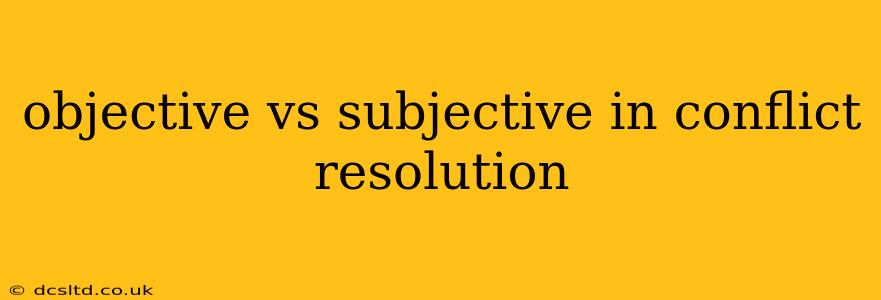Conflict is an unavoidable part of human interaction, whether in personal relationships, professional settings, or international affairs. Successfully resolving conflict requires a nuanced understanding of the difference between objective and subjective perspectives. Failing to distinguish between these can lead to misunderstandings, escalation, and ultimately, failed resolutions. This article explores the crucial roles of objectivity and subjectivity in conflict resolution, offering insights into how to navigate both effectively.
What is Objective Information in Conflict Resolution?
Objective information refers to facts, data, and evidence that are verifiable and independent of personal opinions or biases. In conflict resolution, this might include:
- Concrete events: Dates, times, locations, and observable actions. For example, "The deadline for the project was missed on October 26th."
- Documented evidence: Contracts, emails, reports, or witness statements. "The email clearly states the agreed-upon deadline."
- Neutral data: Sales figures, production statistics, or independent test results. "Sales were down 15% in Q3 compared to Q2."
Focusing on objective information helps to establish a shared understanding of the situation, moving the discussion away from emotional interpretations and towards a more rational assessment of the problem. This is crucial for building trust and fostering collaboration.
What is Subjective Information in Conflict Resolution?
Subjective information encompasses feelings, beliefs, perceptions, and interpretations. These are influenced by individual experiences, values, and biases and are not easily verifiable. In conflict resolution, this includes:
- Emotions: Anger, frustration, fear, hurt, or disappointment. "I felt deeply betrayed when the deadline was missed."
- Perceptions: Individual understandings of events and their significance. "I perceived the missed deadline as a deliberate attempt to undermine my efforts."
- Values: Underlying principles that shape individual priorities and actions. "Meeting deadlines is a fundamental value for me, and its disregard is unacceptable."
While subjective information might not be quantifiable like objective data, it's equally vital in conflict resolution. Ignoring the emotional and psychological aspects of conflict can lead to superficial solutions that don't address the underlying issues.
How to Balance Objective and Subjective Information?
The key to successful conflict resolution lies in finding a balance between objective and subjective information. Neither should be dismissed entirely. Here's how to approach this balance:
1. Validate Emotions: Acknowledge and understand the subjective experiences of all parties involved. Empathy is crucial here. Saying something like, "I understand that you felt frustrated by the missed deadline" can go a long way.
2. Focus on Behaviors: Shift the focus from subjective interpretations of intentions to observable behaviors. Instead of saying "You deliberately sabotaged the project," try "The project deadline was missed, resulting in X consequences."
3. Seek Objective Verification: If possible, corroborate subjective claims with objective evidence. If someone claims they were unfairly treated, look for documented evidence to support or refute their claims.
4. Find Common Ground: Even when perspectives differ, look for areas of agreement. Focus on shared goals and interests to build a foundation for collaboration.
5. Facilitate Open Communication: Create a safe space where all parties feel comfortable expressing their thoughts and feelings, both objective and subjective. Active listening is essential.
Is it Always Possible to be Completely Objective?
Complete objectivity is an ideal, often unattainable in real-world conflict resolution. Our own biases and experiences inevitably influence our perceptions. However, striving for objectivity, by focusing on verifiable facts and minimizing emotional reactivity, significantly improves the chances of a successful and lasting resolution.
How Does Bias Impact Conflict Resolution?
Bias, whether conscious or unconscious, significantly impacts conflict resolution. It can lead to misinterpretations of information, unfair judgments, and the escalation of conflict. Recognizing and actively mitigating personal biases is crucial for effective mediation or conflict resolution.
What are the Consequences of Ignoring Subjective Information?
Ignoring subjective information, such as emotions and feelings, can lead to superficial solutions that fail to address the root causes of conflict. This can result in unresolved tension, recurring conflicts, and damaged relationships.
What are the Consequences of Ignoring Objective Information?
Ignoring objective information can lead to inaccurate assessments of the situation, biased decisions, and ultimately, unjust outcomes. This can further damage relationships and impede effective conflict resolution.
By understanding and effectively managing both objective and subjective information, individuals and organizations can significantly improve their ability to resolve conflicts constructively and achieve positive outcomes. This involves active listening, empathy, a commitment to fairness, and a willingness to find common ground despite differing perspectives.
